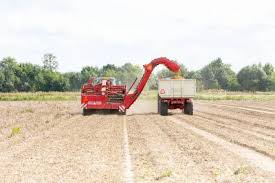Training Course on Post-Harvest Loss Reduction Strategies for Perishable Crops
Training Course on Post-Harvest Loss Reduction Strategies for Perishable Crops is designed to equip agricultural professionals, farmers, and agribusiness stakeholders with innovative and sustainable post-harvest management strategies.

Course Overview
Training Course on Post-Harvest Loss Reduction Strategies for Perishable Crops
Introduction
Post-harvest losses of perishable crops such as fruits, vegetables, and leafy greens remain a major challenge in global agricultural systems, contributing to food insecurity, income loss for farmers, and market inefficiencies. Training Course on Post-Harvest Loss Reduction Strategies for Perishable Crops is designed to equip agricultural professionals, farmers, and agribusiness stakeholders with innovative and sustainable post-harvest management strategies. By leveraging modern technologies and evidence-based techniques, this course addresses critical gaps in the value chain, ensuring better quality produce, extended shelf life, and reduced economic losses.
Participants will explore effective post-harvest handling practices, cold chain solutions, value addition techniques, and digital monitoring tools that can significantly minimize spoilage. This course emphasizes climate-smart agriculture, supply chain optimization, and local context adaptability. Through interactive modules, real-world case studies, and practical exercises, learners will gain comprehensive insights into reducing post-harvest losses while promoting food safety, income sustainability, and environmental responsibility.
Course Objectives
- Understand the causes and impact of post-harvest losses in perishable crops.
- Learn innovative cold chain management solutions.
- Identify climate-smart practices for crop preservation.
- Apply packaging technologies for freshness retention.
- Integrate smart farming tools for quality monitoring.
- Improve logistics for efficient farm-to-market supply.
- Promote food safety through hygienic handling.
- Explore value addition for extended marketability.
- Implement data-driven post-harvest decision-making.
- Adopt biodegradable storage and transport materials.
- Analyze consumer trends for perishable crop marketing.
- Utilize mobile platforms for traceability and logistics.
- Develop community-based aggregation and storage models.
Target Audiences
- Smallholder farmers
- Agribusiness entrepreneurs
- Agricultural extension officers
- Post-harvest handling specialists
- Supply chain managers
- Food safety inspectors
- Development agency staff
- Agriculture policy makers
Course Duration: 5 days
Course Modules
Module 1: Understanding Post-Harvest Losses in Perishable Crops
- Causes of post-harvest losses
- Economic and environmental implications
- Common challenges in perishable crop handling
- Loss quantification and assessment tools
- Community awareness strategies
- Case Study: Tomato Loss Assessment in Eastern Africa
Module 2: Cold Chain and Temperature Control Solutions
- Principles of cold chain management
- Types of refrigeration and storage units
- Low-cost cooling innovations
- Solar-powered cold storage systems
- Transportation temperature control
- Case Study: Cold Chain Success in Avocado Export from Kenya
Module 3: Smart Packaging Technologies
- Role of packaging in loss reduction
- Biodegradable and active packaging materials
- Modified atmosphere packaging (MAP)
- Packaging design for transport resilience
- Cost-benefit analysis of smart packaging
- Case Study: Shelf Life Extension with MAP for Leafy Greens
Module 4: Supply Chain Optimization and Logistics
- Mapping the value chain for perishable crops
- Aggregation centers and local markets
- Real-time transportation tracking systems
- Route optimization tools
- Blockchain in agricultural logistics
- Case Study: Digital Aggregation Platforms in India
Module 5: Digital Monitoring and Smart Farming Tools
- IoT and sensor-based technologies
- Remote quality monitoring
- Mobile-based inventory systems
- Data analytics in post-harvest decision-making
- Integration with weather forecasting tools
- Case Study: Smart Post-Harvest Management for Strawberries
Module 6: Food Safety and Hygiene Practices
- Post-harvest hygiene protocols
- Pest and contamination control
- Training farm workers in sanitation
- HACCP and GAP certifications
- Traceability systems
- Case Study: Improved Food Safety in Mango Supply Chain
Module 7: Value Addition and Agro-Processing
- Preservation through drying, freezing, and canning
- Branding and labeling for niche markets
- Nutrient retention in processing
- Investment in small-scale agro-processing units
- Regulatory frameworks for value-added products
- Case Study: Banana Chips Processing Cooperative in Uganda
Module 8: Community-Based Models and Policy Integration
- Building rural storage cooperatives
- Integrating gender-responsive strategies
- Local government and policy support
- Financial and microcredit access for technologies
- Impact measurement and sustainability
- Case Study: Village Aggregation Centers in Rwanda
Training Methodology
- Interactive lectures and multimedia presentations
- Group discussions and experience sharing
- Field visits and demonstration activities
- Simulation exercises and problem-solving workshops
- Action planning and course evaluation
Register as a group from 3 participants for a Discount
Send us an email: info@datastatresearch.org or call +254724527104
Certification
Upon successful completion of this training, participants will be issued with a globally- recognized certificate.
Tailor-Made Course
We also offer tailor-made courses based on your needs.
Key Notes
a. The participant must be conversant with English.
b. Upon completion of training the participant will be issued with an Authorized Training Certificate
c. Course duration is flexible and the contents can be modified to fit any number of days.
d. The course fee includes facilitation training materials, 2 coffee breaks, buffet lunch and A Certificate upon successful completion of Training.
e. One-year post-training support Consultation and Coaching provided after the course.
f. Payment should be done at least a week before commence of the training, to DATASTAT CONSULTANCY LTD account, as indicated in the invoice so as to enable us prepare better for you.